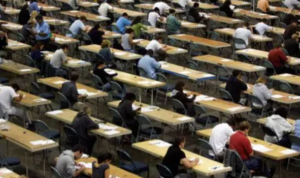
by James A. Bacon
Members of a “collective” of recent law school graduates and professors have signed a petition urging the Supreme Court of Virginia and Virginia State Bar to admit them to the bar without the necessity of taking the bar exam in Roanoke this year. Why? Because they’re scared of the COVID-19 virus.
“It is unsafe and inequitable to administer an in-person Bar exam in July 2020 given the risks of increasing the spread of COVID-19 through travel and large in-person gatherings,” says the petition. “During the Virginia Bar Exam, hundreds of examinees are gathered together indoors over the course of two days.”
Precautions planned by the Virginia Board of Bar Examiners are not adequate, say the petitioners, who numbered 1,157 this morning. The petition offered no specifics on how the administration of the exams would put them at risk other than the fact that they would be held indoors and exam takers would be concentrated in the same hotels. Compelling them to take the exam would “increase the already existing harm to examinees’ finances, families, mental and physical health”
Ah, the old mental health ploy. A sure sign that we’re dealing with snowflakes with exquisite sensitivities.
Granting “diploma privilege,” as the petitions are asking for, would allow all law school graduates to practice law without passing the bar exam. In recent years 25% to 30% of July test takers have failed to pass.
Petitioners advance several arguments:
- Our communities in Virginia need us now more than ever…. especially poor and working class Virginians, and Virginians facing housing evictions.
- Holding an in-person exam — now, or in a few months — poses a significant health risk to test takers and the public. Asymptomatic carriers of COVID-19 would be traveling across the country and bringing the virus into crowded testing rooms.
- Law students will be financially, professionally, and personally harmed by a failure to adopt diploma privilege.
No word in the petition about the negative effects of unleashing lawyers upon the state — more than one in five — who were unable to pass the exam.
According to the Roanoke Times, the Board has posted a list of precautions to limit the risk of infections, including the wearing of masks, temperatures checks before entry, multiple testing areas within the Berglund Center, and social distancing measures. The Board also has created an option for law school grads to take a one-day version of the bar exam in September in Richmond. The Bar has waived the normal fee for switching dates.
Bacon’s bottom line: Any group identifying itself as a “collective” has got to be especially fragile and politically progressive. Perhaps petitioners should be examining their white privilege, as roughly three quarters of all law school students are white. Really, should members of such a white-dominated group be given a pass on one of the toughest exams in their lives?
Here are the enrollment demographics of Virginia’s law schools.
University of Virginia
White: 74%
Black: 5.7%
Hispanic: 5.2%
Asian: 6.8%
College of William & Mary
White: 75.8%
Black: 6.7%
Hispanic: 4.2%
Asian: 3.9%
George Mason University
White: 74.8%
Black: 2.0%
Hispanic: 7.7%
Asian: 7.2%
Washington & Lee University
White: 75.3%
Black: 5.1%
Hispanic: 4.5%
Asian: 6.8%
University of Richmond
White: 73.5%
Black: 6.6%
Hispanic: 1.3%
Asian: 3.2%
Regent University
White: 75.7%
Black: 7.2%
Hispanic: 7.2%
Asian: 3.2%
Liberty University
White: 75.8%
Black: 4.8%
Hispanic: 6.8%
Asian: 3.2%
Appalachian School of Law
White: 69.2%
Black: 12.3%
Hispanic: 4.1%
Asian: 5.5%

Leave a Reply
You must be logged in to post a comment.